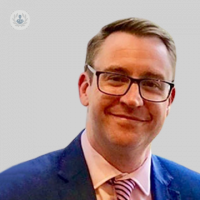Rotator cuff injuries: Diagnosis and treatment
Written in association with:The rotator cuff plays a pivotal role in stabilising and facilitating the wide range of motion that the shoulder joint is capable of. When the function of the rotator cuff is disrupted, this can lead to pain, restricted movement, and a decrease in overall quality of life.
Here, Mr Dave Cloke, renowned consultant orthopaedic surgeon, offers his expert insight into rotator cuff injuries.

What is the function of the rotator cuff, and why is it important for shoulder health?
The rotator cuff is a layer of tendon, surrounding the top of the arm bone, which essentially functions as the socket of the shoulder. This is because the top of the arm is shaped like a ball, but it only articulates with a relatively flat piece of bone - the glenoid.
The rotator cuff keeps the shoulder moving within its space. When the rotator cuff does not work - if it is weak or if it wears out with age - the shoulder starts to malfunction, not working or moving correctly and developing pain and weakness. This can be temporary, but holes can appear in the rotator cuff that severely affect function, though not always by any means.
Some people have holes or gaps in the tendon without any pain or detriment at all. Others end up getting severely arthritic shoulders because of rotator cuff problems. We don’t know why issues develop in some people and not in others.
What are the common causes of rotator cuff injuries, and how can they be prevented?
For most people, rotator cuff issues are not really injuries at all. Swelling, gaps, and holes in the tendon can just appear in some people, probably due to genetics. Again, though, these don’t always cause an issue, and if we scan a large part of the general population, many people will have these things in the tendons of their shoulder. Hence, if you’re genetically going to get these problems, there’s really nothing you can do.
On the other hand, true rotator cuff tears often happen after a wrenching or dislocating injury to the shoulder. These almost inevitably cause severe dysfunction with pain and weakness, and are better of treated with surgery sooner rather than later.
What are the typical symptoms of a rotator cuff injury, and when should I seek medical attention?
Again, the term injury is probably a bit of a misnomer for most people. If you have had a severe injury to your shoulder, usually bad enough to consult a doctor or go to the emergency department, a rotator cuff injury is a possibility. Unfortunately, some people have an X-ray and a tendon injury may not be considered as a result. These things are therefore sometimes missed.
For most people with rotator cuff problems, it is more an insidious onset of discomfort, pain and weakness over time. If this is going on for more than a few weeks and causing you a lot of pain, particularly at night, then you are better off getting seen sooner rather than later. Severe problems such as infection or even tumours that can appear in the bone, as well as any ongoing symptoms, are best investigated sooner rather than later.
Can rotator cuff injuries heal on their own, or is medical intervention necessary?
Pain due to rotator cuff problems can certainly settle itself down. We don’t know why it affects some people and not others, and why some people get better and others don’t. Usually, the initial treatment is physiotherapy. Investigations can be ordered later if things are not improving.
Despite this, true injuries to the rotator cuff such as from a fall or a dislocation rarely settle themselves down, and should thus be investigated and treated as soon as possible.
What treatment options are available for rotator cuff injuries, and what does the recovery process entail?
For a severe injury that has caused pain and weakness in the shoulder, this should be investigated sooner rather than later with either an ultrasound or an MRI scan, and then surgery as required. However, for people who have just developed pain in the shoulder from the rotator cuff, physiotherapy is a good initial mainstay of treatment.
Investigations are not really required until symptoms have been going on for at least a couple of months. These can be quite misleading, for swelling, inflammation, or even gaps in the tendon do not necessarily mean that surgery is going to be required as they can still settle down. They don’t necessarily heal, but equally some people learn to adapt their shoulder movement to compensate for these problems. Pain can come and go over time.
If you would like to request an appointment with Mr Dave Cloke, head on over to his Top Doctors profile today.


